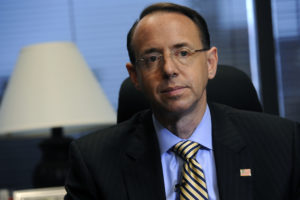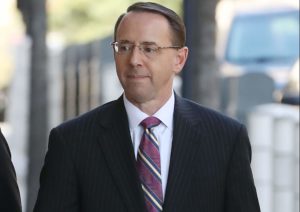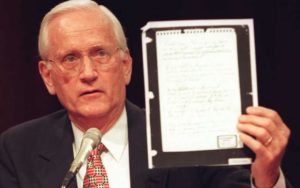¿Es posible destituir a Donald Trump?
Después de haber despedido al director del FBI, James Comey, más voces en EE.UU. reclaman la destitución del cada vez más impopular Donald Trump. DW analiza qué tan real es esta posibilidad.
“Huele a destitución”. La frase estalló ayer miércoles, 10 de mayo de 2017, en las redes sociales. Ya desde el inicio de su mandato, las encuestas del instituto de opinión Gallup mostraron que más de la mitad de los estadounidenses no están contentos con Donald Trump. Desde que despidió al director del FBI, James Comey, las apuestas sobre un posible proceso de destitución se han disparado en las casas de juego. Trump se convertiría en el primer presidente de los Estados Unidos en perder su puesto de esa manera. Pero, ¿cómo sería su proceso de destitución? ¿Qué tan probable es que se lleve a cabo ahora?
¿Qué habla a favor de un proceso de destitución?
1. El despido de Comey es un indicio de abuso de poder
Trump argumentó su decisión diciendo que el director del FBI “no hizo bien su trabajo” de investigación en el asunto de los correos electrónicos de Hillary Clinton. Muchos medios reputados, como New York Times, CNN y Washington Post, informaron que Comey había pedido más medios para su investigación sobre las conexiones con Rusia. Si Trump despidió a Comey para impedir nuevas investigaciones en su contra, estaríamos ante encubrimiento y una forma de abuso de poder.
2. Las acusaciones contra Trump no desaparecerán sin investigación
El Washington Post se remite a “30 fuentes de la Casa Blanca, del ministerio de Justicia y del Gobierno” para asegurar que Trump estaba “furioso” contra Comey porque este no quería apartarse de la investigación de la “conexión rusa”. La cantidad de artículos y reacciones de la opinión pública muestran que el presidente ha logrado justo lo contrario de lo que deseaba y que arrecia el interés por el esclarecimiento de la supuesta “conexión rusa”.
3. Hay suficiente fuerza política para implementar un proceso de destitución
Aunque aún no se ha dado ningún paso concreto, el debate actual sobre un posible proceso de destitución se basa en una situación administrativa real. Si bien es cierto que los republicanos quieren dar la imagen de unidad en torno al presidente, reputados miembros del partido, como John McCain, no han ocultado su oposición a la política de Trump. Las acusaciones contra Trump de que Rusia intervino a su favor en las pasadas elecciones implican traición a la patria, algo que contradice el profundo patriotismo con el que los republicanos se identifican. Hacer oídos sordos a algo así significaría la ruina política incluso para los más fieles seguidores de Trump.
¿Qué habla en contra de un proceso de destitución?
1. Los indicios no bastan para probar el encubrimiento
Hay dos posibilidades para destituir a Trump o sacarlo del sillón presidencial antes de que concluya su mandato. La vigésimo quinta enmienda de la Constitución de EE.UU. contempla la declaración de “incapacidad para el puesto” contra la voluntad del presidente. La segunda posibilidad es el proceso de destitución, mediante el cual, según el Artículo II, Párrafo 4, se puede interponer una demanda presidencial a Trump por “traición, soborno o cualquier otro delito y conducta”, que finalmente conduzca a su destitución. Aunque este proceso es jurídico, se necesita para llevarlo a cabo una decisión política.
2. Los republicanos deben situarse contra Trump
Ambas opciones requieren una mayoría de dos tercios en el Congreso, que actualmente está dominado por el propio partido de Trump, los republicanos, tanto en el Senado como en la Cámara de representantes. Dos de sus líderes, los diputados Paul Ryan, portavoz de la Cámara, y Mitch McConnell, presidente del partido mayoritario en el Congreso, ya han mostrado su conformidad con la decisión de Trump de despedir a Comey.
McConnell ya rechazó el día de la destitución de Comey el nombramiento de un investigador especial para el asunto de la “conexión rusa”, porque “solo serviría para obstaculizar el trabajo actual del FBI y de la comisión del Senado”.
3. Su propio Ejecutivo tendría que querer destituirlo
Para poder aplicarse la declaración de incapacidad que contempla el Artículo 25, el propio gabinete de Trump, junto con el vicepresidente, Mike Pence, tendría que aprobar el procedimiento. Pence ya respaldó públicamente la decisión de Trump de despedir a Comey, diciendo que “tomó la decisión adecuada en el momento justo”.
Conclusión: Posible, pero improbable
Aunque se pudiera formular una demanda para iniciar un proceso de destitución contra Trump por encubrimiento y abuso de poder, sería difícil probar estas acusaciones. Además, faltaría apoyo político por parte de su partido y de su Ejecutivo.
Autor: Maximiliane Koschyk (MS/DZC)
En: DW




